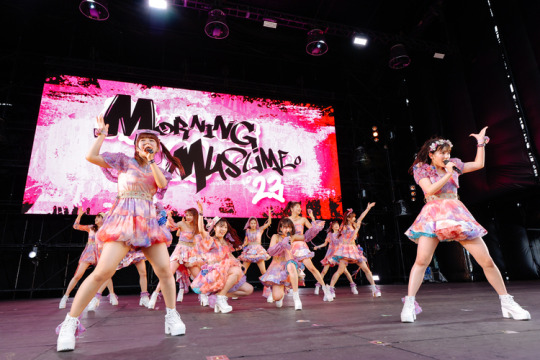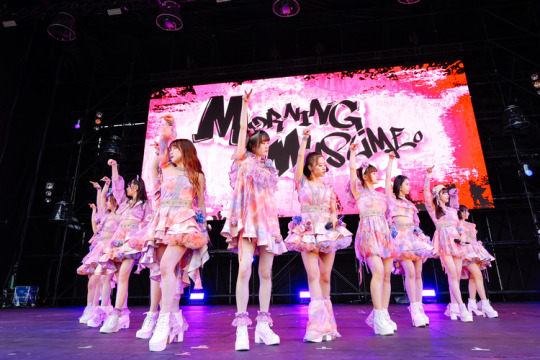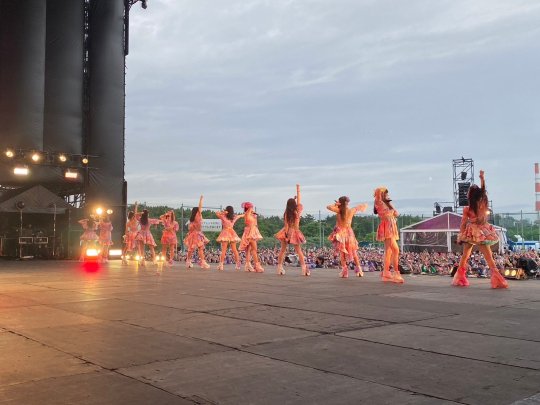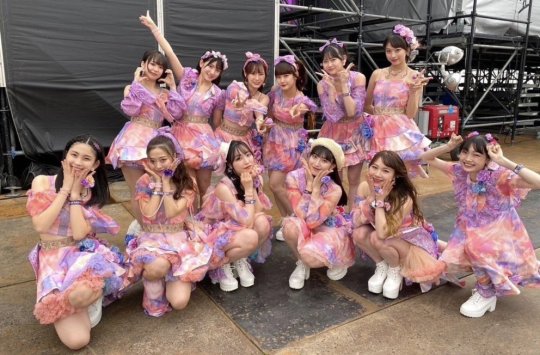#the thing is they have such a vast discog that every year they have a super high energy setlist without it feeling like the same every time
Explore tagged Tumblr posts
Text










Morning Musume at Japan Jam 2023 - Sky Stage
Setlist
Resonant Blue
Ambitious! Yashinteki de Ii Jan
Shabondama
Seishun Night
Kono Chikyuu no Heiwa wo Honki de Negatterun da yo!
Happy birthday to Me!
Wagamama Kinomama Ai no Joke
One Two Three
Souda! We're Alive
Help Me!!
Renai Hunter
Renai Revolution 21
Namidacchi
#morning musume#hello! project#truly cannot wait for the recording of this#the thing is they have such a vast discog that every year they have a super high energy setlist without it feeling like the same every time#namidacchi as an ending this year??? unmatched legendary#perhaps it's gonna be as good a performance as spring 2010#and we still got rij to go i hope they invite them#@ summersonic organizers momusu is right here#i know uf makes it hard sometimes but i love this iteration of momusu so much#they match platinum era momusu in terms of capabilities#and of course bc most of them have been there for over five years; they're seasoned performers#and 15ki/rairii are able to keep up#anyway i just remembered chants are back#the power of that audience singing namidacchi along with them?#doing name calls????#oh god it's the return of MIZUKI DAKEEEEE#and the aisaretais#i think they should bring back chokotto love for fall so i can hear the l o v e lovely call once more#anyway
24 notes
·
View notes
Text
Bassline (& 2020 in general): Re-e-wind
What a strange year, as everyone, everywhere has said a million times… Writing-wise, I’d been doing Record Collector magazine since 2014, and uDiscover (the Universal Records online mag) for not much less, & that all just seemed to (understandably) stop dead with the onset of the pandemic. Since then, I’ve polished off my chapter on the work of Simon Morris and the Ceramic Hobs for Palgrave, & that’s about it, so you’re more likely to find me over on Twitter at Sniffy (@philblackpool) / Twitter these days, blurting out the odd sentence. I hence thought it might be time to revisit a very old piece…
Like many, I’ve been working from home for much of the year, and although I’ve occasionally wanted to pull out my own eyeballs, it has generally been very pleasant for a voracious music-lover. I started by catching up on the vast majority of my insane, years-deep second-hand vinyl buy piles, and then chomped through a load of ‘long listen’ stuff I’d had on the backburner forever (including, astonishingly, eventually getting through something like 40 hours of Pan Sonic live sets someone had dumped online). I graded hundreds of releases for sale on Discogs, and revisited umpteen musical thangs extensively, including 90s gabba, Sun Ra, music hall, Schoenberg, dancehall reggae, the acknowledged worst albums ever, happy hardcore, Italian house, bounce and makina (I’ve lost track of how much time I’ve spent checking out youtubes to try to identify a couple of most-wanted bounce and makina tunes), Britpop (!), cosmic disco, and Belgian popcorn. It’s been an extraordinary year, packed with cultural discovery and rediscovery. In amongst this, in no way ashamed of my abject love of Discogs, and already having used and edited it for many years, I read the entire guidelines and decided to go hard on sorting out stuff I care about on there. Seeing they’d finally added various more recent ‘styles’, I’ve spent the last month and a half doing a ridiculous amount of edits on a dozen or so niche genres of importance in recent times (footwork, Jersey Club, yadda yadda). My tweakings around Bassline and UK Funky eventually drew me to the attention of UK Garage legend Karl ‘Tuff Enuff’ Brown, a fellow Discogs obsessive not so keen on the editing side of the site, who wondered if I might give him a hand sorting out the mess of his own and his label’s (2Tuf 4U) discographies. His entertaining phonecalls were enough to convince me.
I dug out all my stuff related to Karl’s label to listen to along the way, and found myself noticing how much UKG has been back in the spotlight of late (key, and brilliant, article here: RA: Like A Battle: The Push For UK Garage's Future (residentadvisor.net) ). While by no means unaware of this (I’ve had some lovely promos from Kiwi and the like of late, plus some moodier bits from various El-B worshippers), my status as a confirmed middle-aged semi-retired raver had hidden much of this from me. This leads me onto one of my big philosophical points of recent years: I listened to dance music avidly before I ever went out dancing, and listen to it now in lockdown, and in semi-retirement. There is far too much an emphasis among ever-rejuvenating dance music correspondents on ‘the club’ as the only way to enjoy dance music, but we know that OG disco fans are 60+ and unlikely to be out every weekend these days – is their experience now worthless? Online fans talk up their love of dance music for exercise soundtracks, bedtime calming soundtracks, etc: this is reality. Dance music is as valid to all these people as rock is to people who haven’t been to a gig in 40 years.
The style I felt myself most drawn back to was bassline (largely via Karl’s low-key issue of some DJ Q material). My love of UK Garage and all its offshoots largely stems from how physically removed I have been from it from virtually its entire history. Only my 2000-03 stint in Essex perfectly matched the garage waveform, and that was the 2-step era, quite the opposite of bassline. Despite being largely a northern phenomenon, Blackpool is largely untouched by bassline, being all about punk and bounce to my mind. An instant love for me circa 2007, bassline feels like one of those genres with unfinished business, but remains one I’ve rarely danced to. Cut off in its prime, it is now back, enormously popular, and rightly so, but, due to the vagaries of the digital music world, some of its key material remains tough to access in any decent form.
I originally wrote the piece I have butchered for this one in March 2008, on Myspace (remember that), in reaction to the exciting waves of bassline and UK funky then reinvigorating the world of UKG. It looks a bit embarrassing now, with more writing experience, although I continue to applaud my own willingness to be open about my innocent appreciation of things I love but am not truly part of.
The most notable misstep in my original piece was the presumption that bassline would become the latest enormous chart sensation. Like happy hardcore before it, the ball was, in reality, fumbled. Instead of hoped-for freaky innovation, the producers also opted, as many in years gone by, for smoothed-out commerciality (in unholy alliance with low-grade grime crossovers), although the main adversarial issues seem to have been police crackdowns and the London-centric ‘cool police’. Although I was long aware of such problems with Niche in Sheffield (the genre’s spiritual home), it appears that the police interference had a devastating effect across the board ( Banned From Sheffield: How Jamie Duggan fought for bassline… And won (ukf.com) ). This largely explains why many of the bassline producers gravitated towards the largely wack bass house/house & bass style so beloved of teenyboppers in recent years. Thank heavens that era is now largely over.
Niche reputedly specialised in an arguably unholy mixture of dated late 90s speed garage and ‘bassline house’ (think ‘Let Me Show You’ by Camisra, and MK’s ‘organ house’), way past their sell-by date (I still only really like a handful of Shaun Banger Scott bits in this style, one single 2009 Brummie CD EP, and one Virgo remix). Ultimately, though, this experiment unexpectedly created something magical. The crucial element here is the 4/4 beat. While undoubtedly skippy, the vast majority of the material favoured had a firm 4/4 beat, always favoured across all key scenes in the north of England from northern soul onwards. When they ran out of tunes to rinse, in time-honoured fashion, they made their own. Long, rumbling walls of bass, organs, and hoppy-skippy beats, with raggafied samples and gunshots over the top. Popular in Birmingham as well (pretty much the centre of a vinyl glut at the time, and now notable in the popularity of DJs such as Chris Lorenzo and Hannah Wants), B-side titles hinted of coke overload. Disenfranchised by London’s movement away from the holy 4/4 (despite a slight revival in the early noughties), and via messenger services and the like, northern producers began to exchange a new hybrid in the mid-00s which took these speed garage and bassline house influences and updated them with current R’n’B bootlegs, with influences from grime (regional grime producers were key here) and, most notably, with rococo basslines. Its most obvious comparison point was Sticky’s garage productions, concurrent with the early grime era. Southern producers such as Agent X, Delinquent (who featured Gemma Fox on their magical 2006 ‘Boxers’), and Dexplicit (Fox again, 2005’s ‘Might Be’) ran with that, and the north lapped it up. Key early pointers also included DJ Narrows’ superb 2001 4/4 tune ‘Saved Soul’, and early 00s DND work (Artwork, later part of dubstep supergroup Magnetic Man). A notable increase in output came in 2006, and 2007-9 were the genre’s original glory years. And the bulk of producers and up-&-comings delivering serious anthems to the scene came not from London and the south-east, but from Leeds (T2, Wittyboy, Nastee Boi), Bradford (TS7), Manchester (Murkz, Burgaboy, Subzero), Nottingham (Virgo, IllMana), Leicester (JTJ, H20, FB & Zibba), and Wolverhampton (EJ, TRC, Brett Maverick). EJ’s Ejucation mix series (all up on Soundcloud) is a good place to start, beginning as the bassline house began to be overtaken by the pure bassline numbers.
Distribution for serious UK garage music has often been woeful, with only high street compilations & the chart singles (‘Heartbroken’ by T2, ‘What’s It Gonna Be’ by H20, etc) making it all over the country, and this helped stymie the true development of bassline, although vinyl prices, dreadful video promos, and the leap to digital in some ways didn’t help. Years on, as an incorrigible vinyl fanatic, I still only have handful of bassline 12”s. Yes, you can now access this stuff the world over via Youtube etc, but decent, high-quality copies of full-length tunes (they are often hacked about to great effect, but in a way which obscures the original intentions, in the mix) are not always the easiest to come by, although the classic producers are increasingly putting out digital compilations of their original work. Material that would, for previous genres, be fiended after, is lost to being just more online links. At the time, I looked high and low for 12”s, succeeding only rarely, largely on the flip of UK Funky releases. The (mixtape) audience, going by comments online, were often extremely young, are probably now still only in their mid-twenties, and are seemingly happy enough with this chaotic model. Bassline originally, as all rave genres, largely ran off mixtape boxsets, and a 2007 ‘Pure Bass – Fantasy’ box from Stoke remains my key document of that era: seven bassline CDs, with many tracks repeated, but packed to the gills, with most tracks only lasting a minute or two in the mix. As with all rave mixes, it has taken me years to suss the majority of the track IDs. In the Resident Advisor piece linked above, DJ Q (from Huddersfield) talks about thousands of lost bassline tunes, the bad side of the digital revolution. My recent Discogs ferreting suggests more bassline tunes than one might imagine did make some sort of decent release, but too many only made white labels, promo CDs for commercial releases (before being snipped from the main release), mix CDRs, or Youtube’s grainy depths. Classics such as TS7 featuring Bianca’s ‘Seems Like’ appear to never have had any decent release whatsoever, despite TS7 going on to be a big name in bass-oriented house, and Bianca Gerald having kept at the vocal turns ever since.
T2 hit biggest, with ‘Heartbroken’, a gorgeous, smashed-vocal garage dub so popular that it even inspired a Jersey Club refix. His catalogue was immediately deep, although I get the impression he has stopped adding to it. One complaint about bassline, including some of the T2 work, regards the untutored vocals, which can sometimes be rather flat, and certainly lacking in dynamics compared to the dazzling US vocalists featured on some earlier UK garage pieces (I refer here, as always, to TJ Cases’ remarkable ‘Do It Again’). I kinda like that - it shows amateur enthusiasm not far removed from punk, and most obviously links to lover’s rock, as does the production at times: it gives a feeling of melancholy entirely suited to the vocals. Other bassline heroes include TS7, who briefly brought to the fore sassy female garage MC T Dot. His productions also include ‘Smile’, one of my very favourite bassline tracks, full of that Simon Reynolds-quoted 'weird energy’ possessed by DJ Hype & co in the early nineties. Male bassline vocalists such as Ideal also remain unfairly forgotten, although some of the female vocalists have gone on to work in related genres since bassline’s peak.
Paleface, an ex-member of London garage rap crew Stonecold GX, runs Northern Line Records (FB, TRC, Wittyboy, Nastee Boi), something of a quality mark for bassline productions, while also making highly successful UK Funky tunes as part of Crazy Cousinz, and later progressing into commercial house territory. He chronicled much of bassline’s high-water mark (including being married to Kyla, since sampled by Drake). Wolverhampton-based Northern Line signing TRC proved particularly adaptable, spewing out a legion of original tunes and remixes before retreating for a while to grime. Leeds’ Nastee Boi was a favourite of mine at the time, with his pitch-black gangsta bassline tunes, but pushed on towards a mixture of underwhelming R’n’B vocal cuts and nursery grime toons. Wittyboy started similarly punishingly but also went smoother, unbalancing the classic bassline rough and smooth combination.
Now that the dubiously poisonous rep of Niche has been dispatched, the key bassline acts have returned to their key battleground, and the genre seems in full throttle again. Much of the new material seems a little one-dimensional to me: producers invariably big up Bristol’s My Nu Leng as, I suppose, a bridge from bro-step to 4/4. Everything, as acknowledged by the DJs, is huge drops and nothing much else. It still sounds pretty hot though – not the updated lover’s rock of a decade ago, but worth supporting. Bassline is NOT finished!
3 notes
·
View notes
Text
Artists Own the Industry Now!

Do you remember the last time an artist or a song that really captured your mind and your heart? What was that experience like? Was it a mind-blowing, soul-affirming moment that left you a changed person? Did it soothe you? Did it totally rock, man? Read Also: 4 True Crime Channels Every True Crime Fan Should Watch For many of us who came of age in the days before the internet - when the closest thing to streaming was Napster and Limewire, and many of us found out that download of Linkin Park's "In the End" was loaded with viruses - we often turned to the local rock or pop station to get our fix of cool tunes. If we grew up in a big enough city, there was more than likely also a hip-hop/R'n'B station. I grew up in the nineties/early 2000s, so my experience with internet radio was pretty much limited to those obscure stations you would find in Windows Media Player. There were indie, acoustic, and pop stations from places like Italy, Germany, Spain, and other locations across the globe. It was a peculiar time in history. We slowly transitioned from physical media over to what we have now. What really did the industry in, many people believe, was price-gouging on CDs by the record industry. Major labels would charge exorbitant prices for a ten- or eleven-song disc, packaged in those gaudy plastic jewel cases. Once downloads became more "the thing," folks began illegally downloading them to their computers and MP3 players. Read Also: Why it’s good to partake in other forms of expression The industry then targeted young children and teenagers, the most common music consumer. This is why so much music still focuses on themes they can relate to. It's all marketing, really. This backfired big-time, and further painted a picture of record companies as evil, greedy, and money-hungry.
What has changed?

For one thing, it's not the same industry by a long shot. There are more ways in which to enjoy music. We are getting away from digital downloads. There is a vinyl resurgence, which has been going on the past few years - and according to many, media is shifting once more, this time to physical copies. If record executives have learned anything, only time will tell. There are also more ways than ever to release music. While we've seen many - if not most - record stores closing their doors, sites such as Amazon and Discogs still exist if you wish to purchase a CD or vinyl record (and even cassette tapes in some instances, which are still a popular format in the black metal and indie scenes). Self-releasing has also become a more ubiquitous method of putting your art out, and sites like Bandcamp and SoundCloud allow anyone with recording gear and an internet connection to host their art. It's led to what is easily the most diverse era of music in history. The era of the gatekeeper is over. Artists no longer need to worry about auditioning for label heads or sending demo recordings out to labels, more than likely to get told they aren't good enough or the right fit. This has its pros and cons. One of the best things about it is that it has bestowed creators with newfound freedom they just didn't have in the old days. They can define their sound the way they want, rather than having to tailor it to the expectations of the mainstream. This artistic freedom is worth so much more than a nice paycheck, especially to younger acts who are still finding a footing in their chosen medium. Read Also: What I’ve Learned About Music Journalism (So Far) But with this vast well of innovative sounds comes a trade-off. Since there has been an influx of edgy, quirky, or just downright bizarre sounds and easier availability of music, it has become harder for artists to find a footing. There's almost too much art happening, in a way. This isn't necessarily a bad thing (art without restriction is always a positive), but it does make it harder to find a widespread audience. People who want to make it in music may not reach anything more mainstream than cult fame. Even regional popularity might be a thing of the past. Many of the acts I've seen in the places I've lived seem to be stuck, clustered in what amounts to little more than a glorified clique. But, when you think about it, is this really any different from avant-garde scenes in the past? Even when the record industry had more of a stronghold than it does nowadays, you still didn't hear any of the more innovative sounds - unless you were a tastemaker or somebody somehow in-the-know. Nothing has really changed when you think about it. It isn't clear where the industry will be, the farther along the path of history we go. It's a very exciting time to be a music fan, these days. While mainstream music continues to stick with its increasingly outdated formula, times continue to evolve and change. Until the label executives realize that people want more diverse, interesting sounds than what they've been hand-fed for decades (and made more available on a wider basis than before), the labels will suffer - and those artists pushing the envelope will suffer more. Even as they find greater freedom and acknowledgement than their influences. This article originally appeared at Faramira Read the full article
0 notes